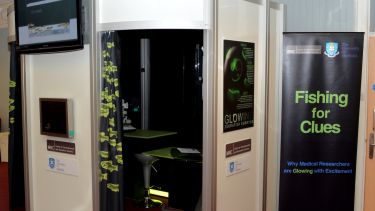Community and outreach
As academic researchers, we are passionate about our science.

The model organisms that we study are important for medical research. They help us understand how our bodies adapt in an ever-changing environment to remain healthy. They also enable us to research what happens when things go wrong and they enable us to analyse how and why we develop a range of different diseases.
We are keen to demonstrate their relevance, as well as their aesthetic beauty, to as broad an audience as possible.
Open Days allow members of the public to visit The Bateson Centre and see a real laboratory in operation.
- Information workshops allow members of the centre to give short presentations about our research.
Scientists and doctors working on specific diseases take the time to talk to patient groups about the biology of the disease, and future hopes for treating disease
We work closely with medical charities, including the Wellcome Trust, the British Heart Foundation (BHF), Cancer Research UK (CRUK) and the Parkinson’s Disease Foundation.
A custom outreach structure (the 'Pod'), designed for the Royal Society Summer Exhibition, supports many of our outreach activities. During these events, clinician and basic scientists are on-hand to describe our research and answer questions.
Through real-time demonstrations, touch-screen quizzes and a mini-lab set-up, the pod lets us demonstrate transgenic "green fish": neurons and blood vessels fish breeding use of fish in drug screening.
Past events have included the University of Sheffield Discovery Night, where the university's laboratories and lectures theatres are open to the public for a host of talks, demonstrations and hands on activities based around research in Science, Engineering, Medicine and Dentistry.
Demonstrations and activities were also offered as part of KrebsFest a celebration of the scientific research of Sir Hans Krebs, winner of the Nobel Prize for his pioneering work at the University of Sheffield.
Members of the public were given an insight of how scientists at the Bateson Centre work with zebrafish to study a range of diseases and were able to use microscopes to observe the transparent embryos, and see the heart pumping and blood circulating.
